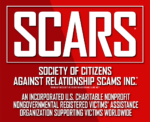SCARS™ Editorial: Call It What It Is!
Abusing Words Abuses Victims Unintentionally!
Over the years helping victims of real scams, we constantly see people (including victims) throwing around the term SCAM and SCAMMING for the most inaccurate purposes. Not everything you don’t like is a scam.
As “Scam Victims” you especially have to be careful about using the word “scammed.” This is something very specific, just like rape. Yes, there is a multitude of scams out there of varying degrees of severity. But poor service or a product that is not what you thought it was are not scams.
A scam is an intentional criminal act – a crime – and there is a real victim!
When We Abuse Terms Then We Degrade The Meaning Of The Term And The Victims Of It.
People are constantly using terms incorrectly and it results in worse communication not better. Scam, Hack, and the whole range of cybercriminality are thrown around but much of the time it is just wrong. In the process, people get confused about what it really means, and then when you tell someone that you are a Scam Victim they will think it is no big deal because THEY were scammed at the McDonald’s drive through!
Same goes for the most abused term “HACK”
We have explored the meaning of what a SCAM is before, please refer to that article.
Hacking: What you think it’s like and how it actually is
When hacking is mentioned, what is the first thing that immediately pops into your mind? A bunch of indecipherable code flashing across a black screen? Loss of critical data and leaked information? What about your impression of hackers? Thanks to Hollywood and media reports, most people would think of them as evil geniuses who use their knowledge of technology to wreak havoc and create a public nuisance.
People are constantly complaining about their email being hacked or their Facebook accounts being hacked. But the fact of the matter is that most of the time, these are NOT HACKS. Someone figured out your passwords and gained access or took over your account. They did not hack Facebook or Gmail. YOU gave them enough clues that they could figure it out, or you let your account credentials leak out.
Hackers break into computer systems, sometimes to gain access to accounts, but usually, work at the large scale. They don’t hack your grandmother’s Gmail account.
In computer security, a hacker is someone who focuses on security mechanisms of computer and network systems. While including those who endeavor to strengthen such mechanisms, it is more often used by the mass media and popular culture to refer to those who seek access despite these security measures – bad actors. That is, the media portrays the ‘hacker’ as a villain. Nevertheless, parts of the subculture see their aim in correcting security problems and use the word in a positive sense.
Not all hackers are bad!
When a hacking incident is reported in the media it is because something – be it access to a website or confidential information – is being compromised. But do you know that companies are actually paying hackers to attack their own systems as well? These ethical hackers, also known as “white hat” hackers, find ways to get into an organization’s information system and then alert the company about them so as to minimize security lapses.
White hat is the name given to ethical computer hackers, who utilize hacking in a helpful way. White hats are becoming a necessary part of the information security field. They operate under a code of conduct (just like we operate under the SCARS Code of Conduct), which acknowledges that breaking into other people’s computers is bad, but that discovering and exploiting security mechanisms and breaking into computers is still an interesting activity that can be done ethically and legally.
Coming up with ways to hack into something can be really tough, but once someone has figured it out and posted the tutorial online, pretty much everyone else can do the same by following the step-by-step instructions.
So When You Abuse A Term …
It is destroying your ability to be taken seriously as a victim. Think about the terms you use – that you think you know what they mean but don’t! Especially respect “scam” because as you found out, it is not a trivial thing.
Also, help your friends and family use terms more precisely too!
The point we are making is we need to be cautious about crying wolf and applying the wrong terms. Because others believe us and we end up devaluing the real victims of scams (or other crimes) in the process.

SCARS™ Team
A SCARS Division
Miami Florida U.S.A.
TAGS: Abusing Terms, Devaluing Victims, Hack, Hacker, Improper Use Of Terms, scam, Scammed, Scammer, Scamming, Wrong Words
END
– – –
Tell us about your experiences with Romance Scammers in our Scams Discussion Forum on Facebook »
– – –
FAQ: How Do You Properly Report Scammers?
It is essential that law enforcement knows about scams & scammers, even though there is nothing (in most cases) that they can do.
Always report scams involving money lost or where you received money to:
- Local Police – ask them to take an “informational” police report – say you need it for your insurance
- Your National Police or FBI (www.IC3.gov »)
- The SCARS|CDN™ Cybercriminal Data Network – Worldwide Reporting Network HERE » or on www.Anyscam.com »
This helps your government understand the problem, and allows law enforcement to add scammers on watch lists worldwide.
– – –
Visit our NEW Main SCARS Facebook page for much more information about scams and online crime: www.facebook.com/SCARS.News.And.Information »
To learn more about SCARS visit www.AgainstScams.org
Please be sure to report all scammers HERE » or on www.Anyscam.com »
All original content is Copyright © 1991 – 2020 SCARS All Rights Reserved Worldwide & Webwide – RSN/Romance Scams Now & SCARS/Society of Citizens Against Relationship Scams are all trademarks of Society of Citizens Against Relationship Scams Incorporated (formerly the Society of Citizens Against Romance Scams)
Legal Notices:
All original content is Copyright © 1991 – 2020 SCARS All Rights Reserved Worldwide & Webwide. Third-party copyrights acknowledge.
SCARS, RSN, Romance Scams Now, SCARS|WORLDWIDE, SCARS|GLOBAL, SCARS, Society of Citizens Against Relationship Scams, Society of Citizens Against Romance Scams, SCARS|ANYSCAM, Project Anyscam, Anyscam, SCARS|GOFCH, GOFCH, SCARS|CHINA, SCARS|CDN, SCARS|UK, SCARS Cybercriminal Data Network, Cobalt Alert, Scam Victims Support Group, are all trademarks of Society of Citizens Against Relationship Scams Incorporated.
Contact the law firm for the Society of Citizens Against Relationship Scams Incorporated by email at legal@AgainstScams.org





Leave A Comment